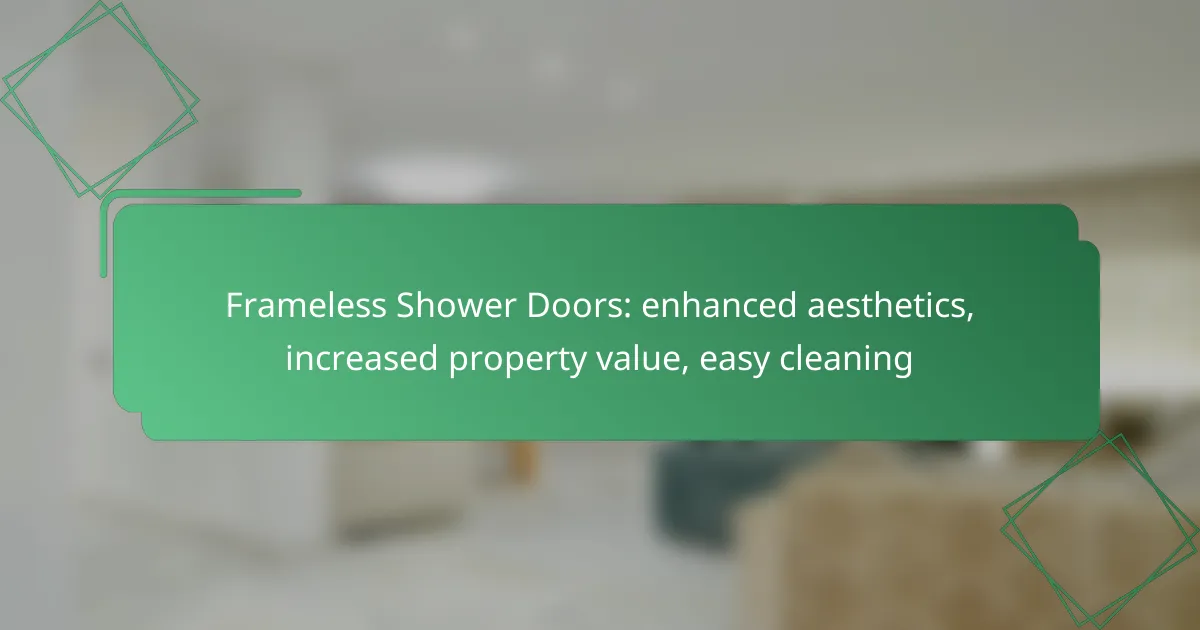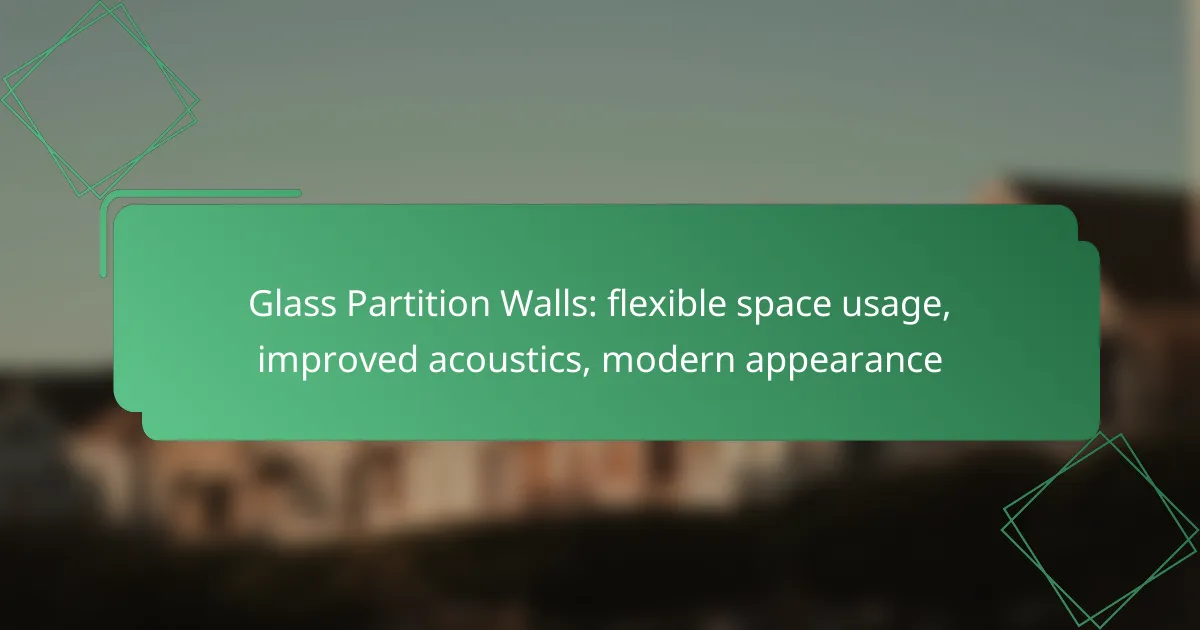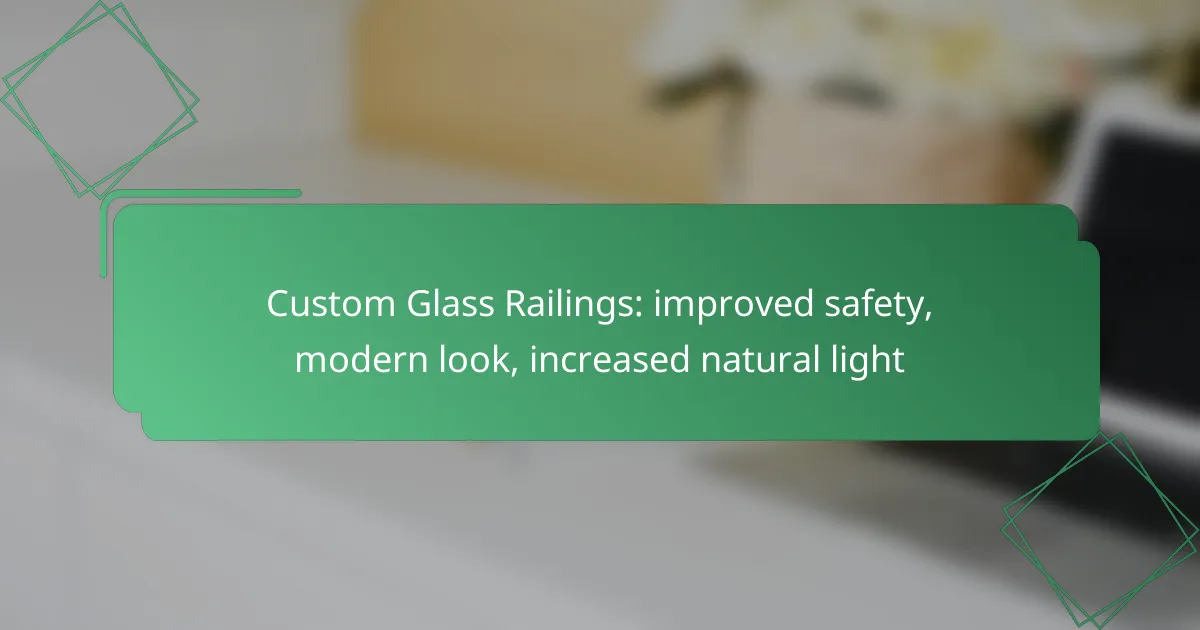When considering glass doors for your home, it’s essential to evaluate both the cost and design options available. Installation expenses in Canada typically range from CAD 1,000 to CAD 3,000, influenced by the type of door and installation complexity. With various designs such as frameless and framed options, along with sliding and hinged mechanisms, homeowners can find solutions that align with their aesthetic preferences and functional requirements.

What are the installation costs of glass doors in Canada?
The installation costs of glass doors in Canada typically range from CAD 1,000 to CAD 3,000, depending on various factors such as the type of door and complexity of the installation. Homeowners should consider both material and labor expenses when budgeting for this project.
Average installation cost range
The average installation cost for glass doors in Canada generally falls between CAD 1,500 and CAD 2,500. This range can vary based on the door’s size, style, and whether any structural modifications are needed. For instance, larger or custom-sized doors may push costs toward the higher end of this spectrum.
Factors influencing installation costs
Cost comparison by door type
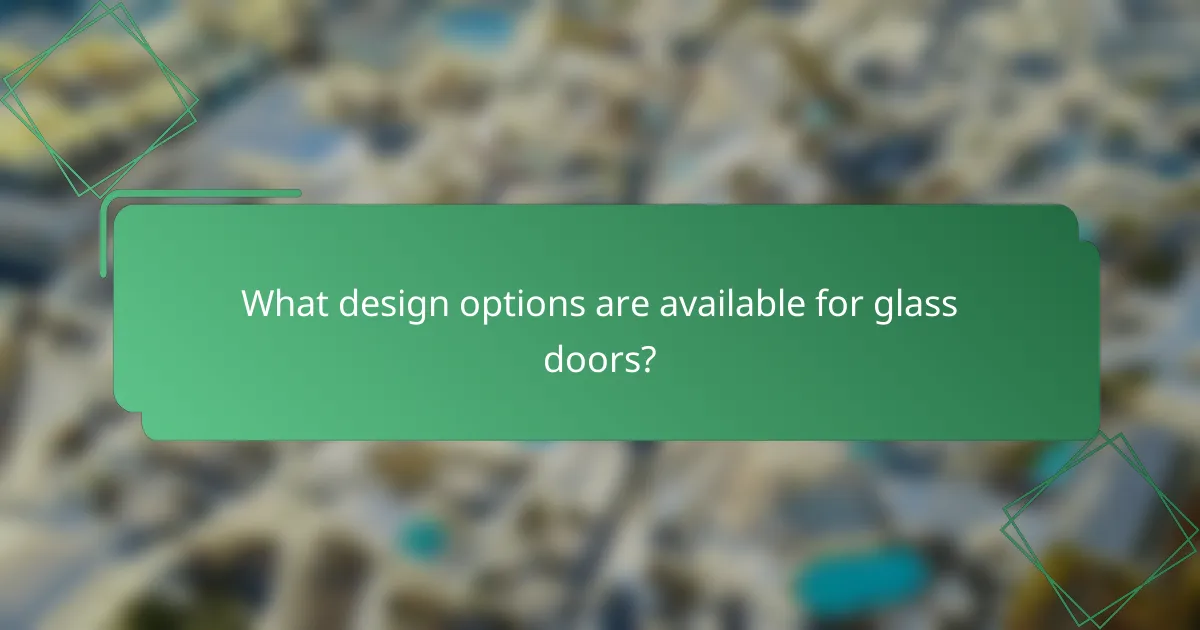
What design options are available for glass doors?
Glass doors come in various designs that cater to different aesthetic preferences and functional needs. The main options include frameless designs, framed styles, and the choice between sliding and hinged mechanisms.
Frameless glass door designs
Frameless glass doors offer a sleek, modern look that emphasizes transparency and minimalism. These designs typically use thick tempered glass, which provides strength without the need for a visible frame.
When considering frameless options, ensure proper installation with appropriate hardware to maintain stability. This style is ideal for contemporary spaces but may require more maintenance to keep the glass clean and free from smudges.
Framed glass door styles
Framed glass doors feature a metal or wooden frame that supports the glass panels, adding durability and structure. These styles can range from traditional to modern, depending on the materials and finishes used.
Framed doors are generally easier to install and can be more cost-effective than frameless options. They also provide additional design flexibility, allowing for various colors and textures that can complement your interior decor.
Sliding vs. hinged glass doors
Sliding glass doors operate by moving along a track, making them a space-saving option ideal for smaller areas. They are commonly used for patios and balconies, providing easy access while maximizing natural light.
Hinged glass doors swing open like traditional doors, requiring more space but offering a classic look. Consider your space and usage needs when choosing between sliding and hinged options, as each has distinct advantages in terms of accessibility and style.
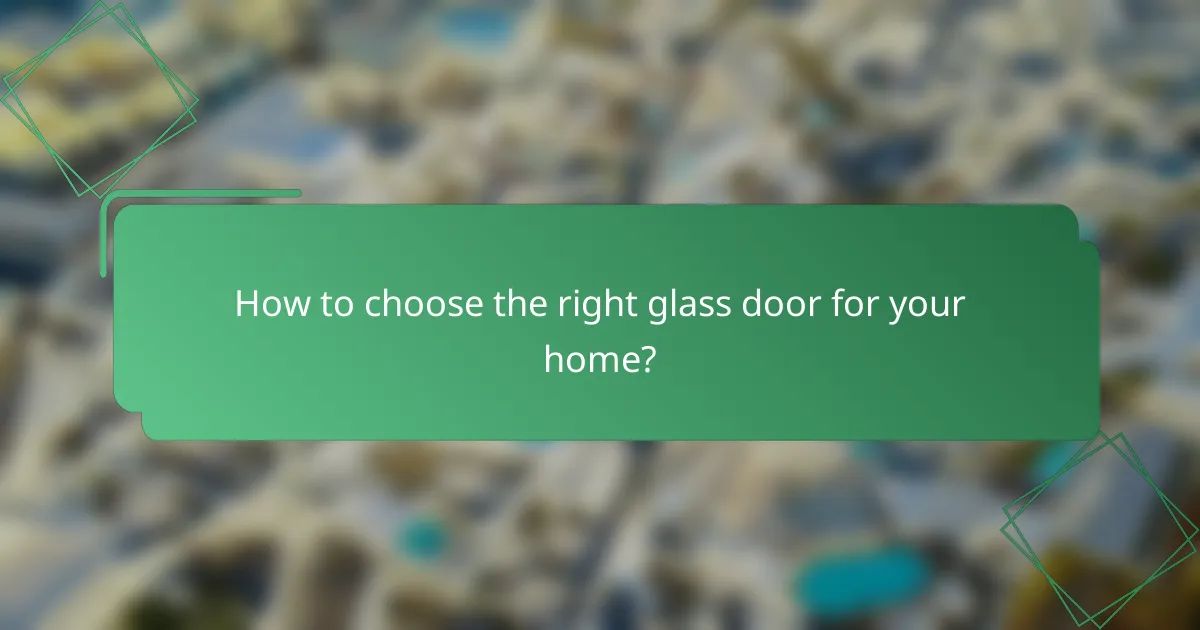
How to choose the right glass door for your home?
Choosing the right glass door involves considering factors such as climate, aesthetics, and energy efficiency. Each of these elements will impact the functionality and appearance of your door, ensuring it meets your specific needs.
Considerations for climate in Canada
Canada’s diverse climate requires careful selection of glass doors to withstand extreme temperatures. Look for doors with insulated glass to enhance thermal performance and reduce heat loss during cold winters.
Additionally, consider the door’s frame material. Fiberglass and vinyl frames offer better insulation compared to aluminum, which can conduct cold. Ensure that the door is rated for your specific climate zone to maximize durability and efficiency.
Assessing aesthetic preferences
Your glass door should complement your home’s architectural style. Options range from sleek modern designs to classic styles with decorative elements. Consider the finish, color, and hardware to create a cohesive look.
Transom and sidelights can enhance the visual appeal and allow more natural light into your space. Take the time to explore various designs and materials to find the perfect match for your home’s interior and exterior.
Evaluating energy efficiency ratings
Energy efficiency ratings are crucial when selecting a glass door, especially in regions with high energy costs. Look for doors that meet or exceed ENERGY STAR® standards, which indicate superior insulation and reduced energy consumption.
Check the door’s U-factor and Solar Heat Gain Coefficient (SHGC) ratings. A lower U-factor indicates better insulation, while an appropriate SHGC will help manage solar heat gain, making your home more comfortable year-round.

What are the maintenance requirements for glass doors?
Glass doors require regular maintenance to ensure their functionality and aesthetic appeal. Key aspects include cleaning, inspecting for damage, and addressing any repairs promptly to prolong their lifespan.
Cleaning and upkeep tips
To maintain glass doors, regular cleaning is essential. Use a mixture of water and mild detergent or a specialized glass cleaner to remove dirt and smudges. Avoid abrasive materials that could scratch the surface.
Additionally, check the tracks and frames for debris and wipe them down to prevent buildup. A soft cloth or sponge can help keep the glass sparkling without damaging it.
Common repair issues
Common repair issues for glass doors include scratches, chips, and seal failures. Scratches can often be polished out, but deeper chips may require professional repair or replacement of the glass panel.
Seal failures can lead to condensation between double-glazed panels, reducing insulation efficiency. If you notice fogging, consider consulting a specialist to assess whether the seals need replacement.

What are the benefits of installing glass doors?
Installing glass doors offers numerous advantages, including enhanced natural light, improved aesthetic appeal, and increased property value. These benefits make glass doors a popular choice for both residential and commercial spaces.
Enhanced natural light
Glass doors significantly increase the amount of natural light entering a space, creating a brighter and more inviting atmosphere. This can reduce the need for artificial lighting during the day, potentially lowering energy costs.
When considering glass doors, think about their placement. For example, sliding glass doors leading to a patio or large glass panels in a living room can maximize sunlight exposure. Ensure the glass is energy-efficient to maintain temperature control.
Improved aesthetic appeal
Glass doors enhance the visual appeal of a property, providing a modern and sleek look that can complement various architectural styles. They create a seamless connection between indoor and outdoor spaces, making areas feel larger and more open.
To maximize aesthetic benefits, consider different design options such as frosted or tinted glass for added privacy while still allowing light. Choosing stylish frames can also elevate the overall design, making the doors a focal point in your home or office.
Increased property value
Installing glass doors can increase a property’s market value, appealing to potential buyers who appreciate modern features and natural light. Homes with well-designed glass doors often sell faster and at higher prices compared to those without.
When upgrading to glass doors, ensure they meet local building codes and energy efficiency standards. This not only enhances value but also attracts environmentally conscious buyers. Consider consulting a real estate professional to understand the potential return on investment in your specific market.

What are the local regulations for glass door installations in Canada?
In Canada, glass door installations must comply with specific local regulations that ensure safety and energy efficiency. These regulations vary by province and municipality, so it’s essential to check local building codes and guidelines before proceeding with installation.
Building code requirements
Building codes in Canada set standards for the structural integrity, safety, and energy efficiency of glass doors. For instance, the National Building Code of Canada (NBC) outlines requirements for materials, installation methods, and thermal performance. Glass doors must often meet specific impact resistance and thermal insulation ratings to ensure they are suitable for local climates.
Additionally, provinces may have their own amendments to the NBC that further specify requirements. For example, in British Columbia, the building code may require tempered or laminated glass for exterior doors to enhance safety.
Permitting process overview
The permitting process for glass door installations typically involves submitting plans to the local building authority for approval. Homeowners or contractors must provide detailed drawings and specifications that demonstrate compliance with building codes. The review process can take anywhere from a few days to several weeks, depending on the municipality.
Once the plans are approved, a permit must be obtained before installation can begin. It’s crucial to ensure that all necessary permits are secured to avoid fines or the need for costly modifications later. Always consult with local authorities to understand specific requirements and timelines for your area.

What are the emerging trends in glass door designs?
Emerging trends in glass door designs focus on functionality, sustainability, and aesthetics. Innovations like smart glass technology and eco-friendly materials are becoming increasingly popular, catering to modern architectural needs and consumer preferences.
Smart glass technology
Smart glass technology allows glass doors to change their transparency based on environmental conditions or user preferences. This feature enhances privacy and energy efficiency, making it a desirable option for both residential and commercial spaces.
When considering smart glass, evaluate the control mechanisms available, such as manual switches or automated systems that respond to light levels. Costs can vary significantly, typically ranging from several hundred to a few thousand dollars per panel, depending on the technology and installation complexity.
Be aware of potential trade-offs, such as the need for electrical connections and maintenance of the control systems. Ensure that your installation complies with local building codes and regulations to avoid any legal issues.







